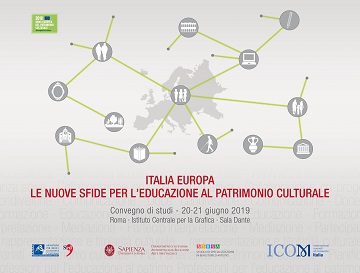
On 20 and 21 June 2019 the ITALIA EUROPA study conference was held in Rome at the Dante Room of the Central Institute for Graphics. THE NEW CHALLENGES FOR CULTURAL HERITAGE EDUCATION, promoted and organized by the MiBAC - Directorate General for Education and Research, by Sapienza University of Rome - Department of History Anthropology Religions Performing Arts, School of Specialization in Historical and Artistic Heritage and by ICOM Italia, with the participation of the Council of Europe.
Context
The topics covered by the conference are in line with the Recommendations of the Committee of Minister to member States on the European Cultural Heritage Strategies for the 21st century and with the general objectives of the Third National Plan for Heritage Education, to dialogue – in a confrontation between institutions, the academic world, associations and civil society – on fundamental issues, experiences and future developments in the field of cultural heritage education.
The preparation phase of the Conference was started in 2018: this date marks the twenty-year anniversary of crucial documents and actions, such as the Recommendation R (98) n. 5 of the Council of Europe, the results of the National Commission for Museum and Territory Education, the stipulation of theFramework Agreement between the Ministry of Cultural and Environmental Heritage and the Ministry of Education (20 March 1998) and the establishment of the Museum and Territory Educational Services Center (15 October 1998).
Goals
In line with the results of theEuropean Year of Cultural Heritage 2018, the conference aims to present, in a national and community perspective, the theme of heritage education through a comparison between the various actors who, over time, have committed themselves to guaranteeing cultural knowledge and accessibility, to promote and support methodological research, attention to training needs, openness to networks and the construction of new alliances.
Themes
The potential and systemic value of networks; the progressive multiplication of the actors involved in the last twenty years; the new arrangements and strategies of governance; new profiles and professional training; methods of access and mediation; the processes activated by the digital transformation; the new guidelines regarding quality levels; search results; the current challenges of active citizenship, intercultural dialogue and cultural participation.
Structure
Aimed at sector operators, heads of educational services, trainers and students, the two-day conference will open with a general part concerning the development of guidelines in the European and Italian context, to continue with three thematic sessions and one final stage.
The I Session – Towards a governance for cultural heritage education – it will be articulated around the definition of goals and experiences to put in place for one governance integrated and participatory to the heritage. In particular, the reflection will focus on the characteristics and potential of sector networks and on the multiplication, in recent years, of roles and subjects active in heritage education.
The topics covered by the II Session – Training for cultural heritage education – will focus on education 'to', 'for' and 'through' cultural heritage in school education; initial and in-service training of teachers as education professionals; professional profiles for cultural heritage; cultural institutions; comparison with Europe.
The focus of the III Session – Accomplice cultural institutions and inclusive heritages – will examine: accessibility as a necessary condition to give life to the engagement of cultural institutions with society; citizenship education in the contemporary cultural landscape; mediation projects and activities in dialogue with other cultures; digital culture, languages and technological tools as resources for heritage education; comparison with the European situation.
In Conclusions, the testimonies will be presented, collected through short video interviews, of some of the numerous realities involved in the issues addressed by the conference; finally there will be a critical restitution, by the discussants, of the contents developed in the different sessions.
Ideas and operational proposals, which emerged during the work, will form a functional basis for the drafting of a Charter for cultural heritage education.
The heads of the MiBAC educational services will be able to contribute to the definition of objectives and strategic guidelines for cultural heritage education by sending a text (max. 1000 characters) to the address sed@beniculturali.it.
Training
The days of the study conference are part of the training activities promoted by the Directorate General for Education and Research for MiBAC personnel and will be broadcast via stream on the Moodle platform (credit recognition method: Circular DG-ER n. 16/2019).
Promotion and dissemination
The conference is entirely video-recorded, translated into both English and LIS and broadcast via the MiBAC YouTube channel at the following links:
- 20 June: Watch Page: https://www.youtube.com/watch?v=MvROhX8haAc
- 21st June: Watch Page: https://www.youtube.com/watch?v=FY-0Nlzns3Q
Results, documents and materials of the conference will be shared through the institutional websites of the Directorate General for Education and Research (www.dger.beniculturali.it) and the Center for educational services of the museum and the territory (www.sed.beniculturali.it)
Useful Documents
Notes for cultural heritage education (30 September 2019)
